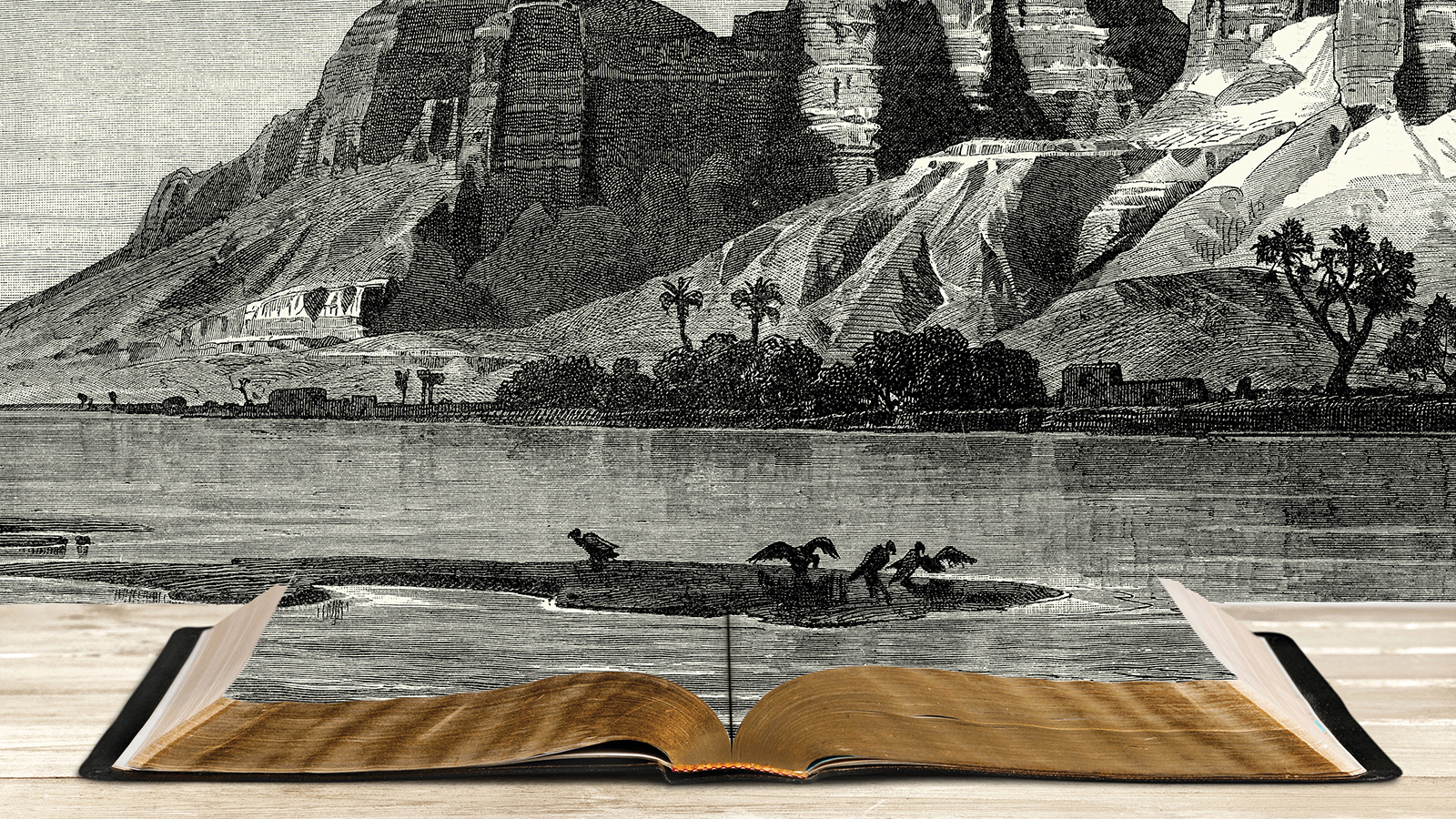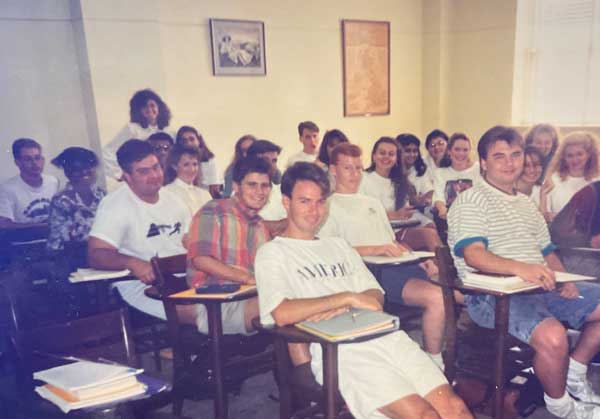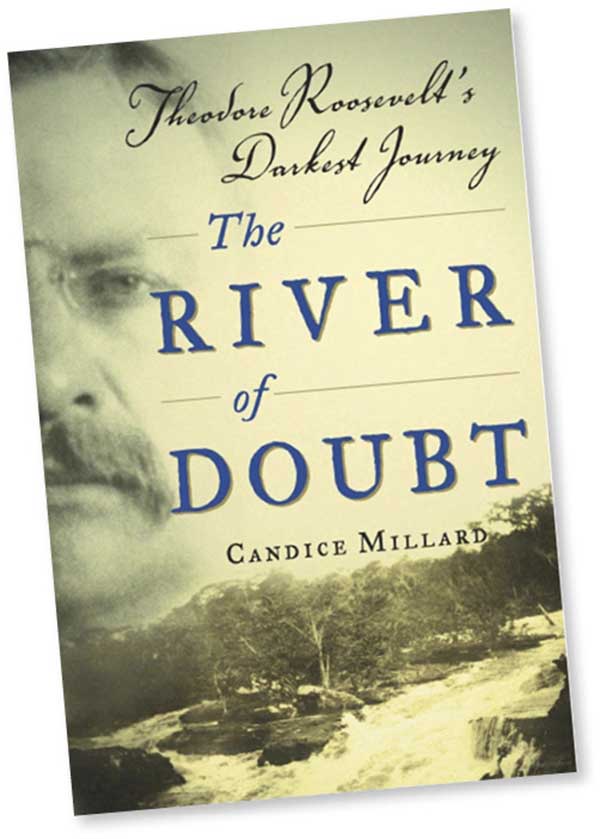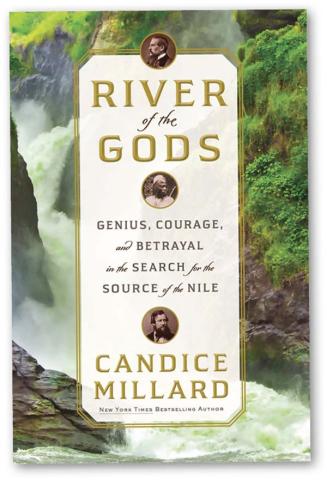Telling Big Stories
Arts & Sciences alumna and best-selling author Candice Millard makes history come alive
(Photo by Paul Versluis)
Writing history with the appeal of a page-turning novel has propelled Candice Millard to the top of the literary world. With four books published and a fifth in the works, the former Baylor Arts & Sciences graduate student has developed a voice and style that resonates with readers and feeds her own spirit of adventure.
“I try to write what I want to read,” said Millard, who earned a Master of Arts in English from Baylor in 1992. “I want to read something that’s going to completely suck me in where I am completely in the story and I kind of forget about my surroundings, and that’s what I hope to do with my books.”
Millard’s newest book, “River of the Gods: Genius, Courage, and Betrayal in the Search for the Source of the Nile,” was released by Doubleday in May 2022 and quickly made the New York Times Best Seller list for nonfiction. It follows three previous NYT best sellers that capture defining moments in the lives of Winston Churchill and Presidents Theodore Roosevelt and James A. Garfield.
“Someone like Roosevelt or Churchill — we’ve talked about them for so long that they almost don’t seem real until you see them in a situation where they’re struggling, they’re afraid or they’re sick or they’re disappointed,” Millard said. “We’ve all had those experiences in our own lives, and that’s what really interests me because then you can really understand someone’s character in that way.”
Chapter One:
Beginnings and Baylor
Millard’s own story begins in Lexington, Ohio, a town of fewer than 5,000 midway between Columbus and Cleveland, where she was always checking out books from the library. The family later moved to Kansas City where her parents both worked for Sprint. She graduated from Baker University, a small liberal arts college in Baldwin City about 16 miles south of Lawrence, Kansas.
Millard’s parents didn’t attend college, but with two older sisters paving the way and Baker attracting many first-generation college students, she didn’t feel like she was in new territory.
“We were proud to be in college, and very grateful for the opportunity,” she said. “My parents did everything in their power — making sacrifices, taking on debt themselves, helping me get scholarships — not only to make sure that I got a college education but that I would begin my working life debt-free. I had nothing but gratitude for my situation.”
Her first thought was that she would be a high school teacher, and even had some interviews and got a couple of job offers, but she became the first in her family to attend graduate school when her oldest sister suggested she get a master’s degree in English. She researched schools and not only found that Baylor had an excellent graduate program in literature, but they offered her a full scholarship.
“I loved it. It’s very different from going to undergraduate where you kind of drop into a bigger pool of people. Here, it’s like everybody around you has the same interests, we all love writing so it was very easy to connect with them,” she said.
“At Baylor as a TA you really got to teach the classes,” she said. “Being able to have that connection with my students was a great experience. And my own teachers were excellent teachers who opened my eyes to a broad array of things, so I was really grateful for the time there.”
Among her professors, Millard especially remembers Dr. Jude Nixon, an associate professor at Baylor from 1989 to 1996, who directed her thesis, “Manifestations of Labor in Victorian Literature.”
“I realized I don’t want to write about academic things or for academic journals for a relatively small group of people. I want to tell big stories.”Candice Millard
“I wanted to write about bibliotherapy, which I still totally believe in. I think that books are a refuge, and I think that if you are illiterate, what you’re denied is not just knowledge but this comfort, this refuge, this escape,” she said. “It was in the early ’90s and not many people were talking about that, so Dr. Nixon helped me direct it into an easier-to-approach topic where I would have more research to work with.”
During the summer while writing her thesis, Millard waited tables at Waco’s historic Elite Cafe to pay her rent. With a father who worked his way up from climbing utility poles to an executive office, and a mother who was an executive assistant, Millard was not afraid of hard work.
“It was not an easy job and you don’t make much, but it was the only job I could get that would pay enough with tips and stuff,” she said.
Millard initially planned to get a PhD and teach English, but by the time she completed her master’s, she knew she didn’t belong in academia.
“I realized I don’t want to write about academic things or for academic journals for a relatively small group of people. I want to tell big stories,” she said. “I moved back to Kansas City, moved back in with my parents, penniless, and I just started looking for a job and slowly worked my way into what I’m doing now.” ›
Chapter Two:
Honing Her Craft
Millard’s first jobs were with a publisher of apartment guides and a trade journal that covered international broadcasting. Her dream job was to work for National Geographic, and through a connection she describes as “my boyfriend’s college roommate’s twin brother’s friend,” she learned about a research position in the television division. She got the job and quickly moved to the magazine where she was a writer and editor for six years.
“They put us into different groups to try to find stories, and I’ve always been interested in stories of people more than animals or rivers or anything like that, so I asked to be in biography and history,” she said. “I loved looking for ideas in those fields and just always knew that’s what I wanted to do; I wanted to tell stories about people and natural settings.”
When marriage and a move from Washington, D.C. back to Kansas City took Millard away from National Geographic, writing books was a natural progression for her talents and interests. A friend and history author tipped her off about a trip Teddy Roosevelt took on an unmapped river in the Amazon rainforest after his time in the White House, and the result was Millard’s first book: “The River of Doubt: Theodore Roosevelt’s Darkest Journey,” published in 2006.
“It had a lot of natural history, evolution and science in it, and I love all these things,” she said.
Chapter Three:
Writing Big Stories
Millard said it typically takes her five years to research and write a book, and it begins with finding a compelling story with plenty of primary source material.
“I don’t write cradle-to-grave biographies. I find some moment that I hope will be very illuminating about this person and this time, and I hope will be a page turner,” she said. “In order to do that, you don’t just need a good story or good characters; you need a ton of primary source material — like so much that you think you won’t ever get through it.”
The next step is structuring the book.
“I don’t write cradle-to-grave biographies. I find some moment that I hope will be very illuminating about this person and this time, and I hope will be a page turner.”Candice Millard
“There are really a million different ways you can come at it, and if you want to have that kind of narrative tension, you have to think about it ahead of time; you have to kind of set it up,” Millard said.
Her new book, “River of the Gods,” begins not with the main character, British explorer Richard Francis Burton, but with William Richard Hamilton, a British officer who finds and carries the Rosetta Stone from Egypt to England and becomes a founding member of the Royal Geographical Society. Then enters Burton, who sets out to find the source of the Nile at a time when there is an international obsession with ancient Egypt.
“A lot of it is explaining why you should care, why did anybody care about finding the source of the Nile, why was that important?” she said.
Millard confesses to loving the research, which includes digging through archives and visiting locations she will write about. “River of the Gods” took her to England and East Africa.
“I’d been there once before with National Geographic. I had written a story on Ethiopia and the Kingdom of Aksum and I was so excited to go back,” she said. “So that is my favorite part: going and meeting people and seeing where these stories played out.”
The most challenging part of the process is organizing all the material. She uses a system she created out of desperation when working on her first book about Teddy Roosevelt.
“I really flailed around at first because I did outline it, but not to the extent that I needed to and I started writing and I was just immediately lost in the trees,” she said.
To ensure that doesn’t happen again, she categorizes every note and reference and grades them for importance. And then she writes an outline, which can easily take a year.
Chapter Four:
New Stories
Millard lives in metropolitan Kansas City with her husband and three children. She works out of an office at Uhlig Advanced Publishing Systems, a company founded by her husband.
“I try to write what I want to read…something that’s going to completely suck me in where I am completely in the story and I kind of forget about my surroundings. That’s what I hope to do with my books.”Candice Millard
“It’s been books and babies for me for the last 20 years, and it’s hard to work at home if you’ve got little ones who know you’re there,” she said. “I always think of my office as like a time capsule, because I walk in the door, close it, and I go back in time to wherever the story is that I’m working on.”
Where will that time capsule take Millard and her readers next? As she embarked on a book tour for River of the Gods, she also was writing a proposal for her next literary adventure.
“I’m really excited about it,” she said. “I can tell you it’s set in World War I and it’s a really rich, fascinating story.”



